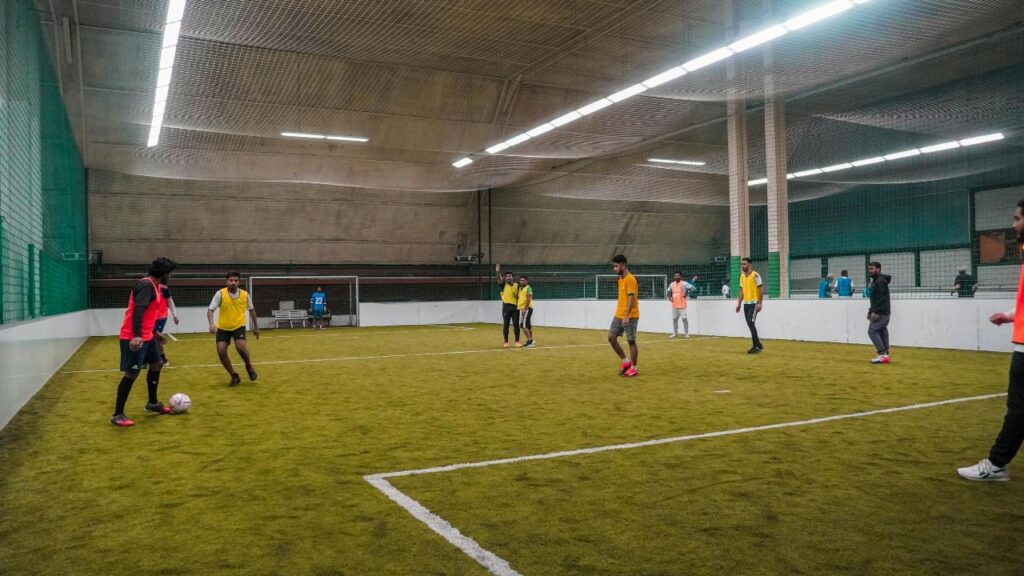African football has exploded onto the global stage with an energy and passion that’s impossible to ignore. What was once the quiet beat of underdogs fighting to be seen has transformed into a roaring anthem of triumph, skill, and raw brilliance. Across continents, African players have rewritten the narrative, turning dreams into reality at the highest levels—from the rapidly improving domestic leagues to the glittering arenas of European football. The story is about more than just goals; it’s about culture, resilience, and a digital-age surge powered by iconic brands like Nike, Adidas, and Puma, fueling this revolution. This rise reflects decades of perseverance, grassroots development, and a hunger that’s reshaping what the world expects from African football.
In 2025, the African continent doesn’t just produce football stars; it commands respect as a powerhouse shaping tactical trends, cultural fervor, and even the business of football worldwide. This isn’t some distant prophecy. It’s happening now, with emerging talents honing skills at venues backed by sponsors like Umbro, Kappa, and New Balance, while colossal clubs in Europe depend on African flair to lift trophies. The connection between local passion and global stages is tighter than ever, creating a thrilling fusion that’s equal parts underdog grit and superstar spectacle.
This transformation throws light also on the evolving African leagues, whose rising standards are attracting investments and broadcast deals unseen before in the continent’s history. Backed by the enthusiasm of fans who embody football’s unique rituals and traditions from Lagos to Cairo, African football culture is not only growing—it’s becoming indispensable to the global game. Whether it’s youthful academies nurturing the next Mohamed Salah or the electrifying matches that hold millions captive, African football’s surge is storytelling at its finest, a living, breathing saga worthy of the world’s stage.

Top African Football Stars Lighting Up Europe’s Elite Leagues
When it comes to African football’s global footprint, the dazzling exploits of African players across Europe’s major leagues have loomed largest. The Premier League, La Liga, Bundesliga, and Ligue 1 — these are no longer distant dream stages but arenas where African talent has taken center stage. Big names like Mohamed Salah, Sadio Mané, Riyad Mahrez, and Victor Osimhen have done more than score goals; they’ve become cultural icons and symbols of African identity, resilience, and footballing artistry.
Mohamed Salah’s journey since arriving at Liverpool is a blueprint of persistence and brilliance. His electrifying pace combined with surgical finishing has shattered Premier League records and earned him multiple golden boots. His influence extends beyond goals, igniting stadiums and inspiring millions of youth who see him as proof that Africa’s diamonds can shine brightest when given the platform. Likewise, Sadio Mané, who dazzled in Liverpool colors before signing for Bayern Munich, brings a unique blend of tenacity and flair, running down defenders with relentless energy that echoes Africa’s untamed spirit.
Other stars, such as Riyad Mahrez of Manchester City, have skillfully orchestrated midfield magic and played key roles in clinching domestic titles and Champions League glory. These players, apart from representing African pride on the biggest stages, have brought the continent’s rich footballing heritage into European football’s limelight, breaking barriers long ago thought insurmountable.
- Numbers tell a story: African players scored over 150 goals collectively in Europe’s top five leagues during the 2024/2025 season alone.
- Brand deals and endorsements: Nike, Adidas, and Puma lead the pack sponsoring top African stars, emphasizing their global market value and appeal.
- Leadership roles: African stars frequently captain their clubs, highlighting a shift in how they are perceived beyond just athletic ability.
- Community impact: These players invest back home in grassroots initiatives and football academies.
- Historic milestones: African nationals have been shortlisted for major awards like the Ballon d’Or more consistently than ever before.
| Player | Club (2025) | League | Goals in 2024/2025 Season | Main Achievement |
|---|---|---|---|---|
| Mohamed Salah | Liverpool FC | Premier League | 26 | Premier League Golden Boot, key to Liverpool’s UCL push |
| Sadio Mané | Bayern Munich | Bundesliga | 21 | Bundesliga Title Winner, Champions League finalist |
| Riyad Mahrez | Manchester City | Premier League | 15 | Premier League and UCL Titles |
| Victor Osimhen | Napoli | Serie A | 22 | Serie A Top Scorer contender |
This wave of talent doesn’t just score goals and win trophies; they rewrite footballing narratives. Their presence challenges outdated stereotypes and encourages clubs across the world to scout African talent aggressively. They’ve become the beating heart of elite competition, embodying skill, speed, and stamina combined with an unbreakable spirit fueled by flashes of samba-like creativity that rivals any legend.
Revamping African Domestic Leagues: The Growth of Local Football Powerhouses
The rise of African football wouldn’t be as potent without the transformation happening within the continent’s own competitions. For years, local leagues in Africa lagged behind due to funding challenges, lack of infrastructure, and limited global exposure. But as the continent’s football economy gains momentum, domestic leagues are seeing unprecedented upgrades, attracting better players, improved coaching, and intelligent administration.
South Africa’s Premier Division, for instance, exemplifies this evolution. Increased sponsorship deals, broadcasting rights, and corporate investment have facilitated upgrading stadiums, boosting player wages, and sharpening competition across the league. Meanwhile, Egypt’s Premier League has similarly benefited from fresh financial injections and marketing initiatives, enriching fan engagement and enticing talent to stay longer on home soil.
Nigeria’s Professional Football League, once riddled with organizational troubles, is now on a cautious but promising upward trend. Investments in youth development programs and emphasis on management professionalism are a clear sign that African football administrators are committing to sustainable growth—something that aligns with growing continental ambitions to shape global competitions.
- Investment sources: Public-private partnerships, with companies like Kia sponsoring league events.
- Infrastructure projects: New stadium builds and renovations funded by local governments and multinational brands.
- Player retention: Improved wages and conditions encouraging talents to develop domestically before Europe.
- Broadcasting and media: Enhanced live coverage deals helping leagues reach wider audiences.
- Fan engagement: Embracing social media and streaming platforms to grow followings.
| League | Country | Investment Increase (2020-2025) | Average Attendance | Top Sponsor |
|---|---|---|---|---|
| South African Premier Division | South Africa | 75% | 12,500 | Kia |
| Egyptian Premier League | Egypt | 60% | 18,000 | Umbro |
| Nigeria Professional Football League | Nigeria | 40% | 9,000 | New Balance |
The rise of African domestic leagues provides players with platforms to showcase their skills and grow. It also brings more competitive balance to international club tournaments like the CAF Champions League, which is gaining in stature. As local tournaments evolve, there’s an invigorating blend of tradition and ambition, echoing the intense football rituals and fan cultures that make African football so vibrant.
The Crucial Role of Youth Development and Football Academies in Africa
At the heart of Africa’s football surge is an intense focus on youth development. Across the continent, academies and grassroots programs are fast becoming football factories, honing young talents and providing pathways into professional football. The approach is holistic, combining football training with education in ways that prepare young players not just for sport but for life.
Senegal’s Génération Foot Academy is a flagship example, having nurtured global stars like Sadio Mané and Ismaïla Sarr. The success stories from such academies are adding fuel to the continent’s confident roar, showing how targeted investment in coaching and facilities can pay dividends on the grandest stages.
Countless other academies backed by global brands—Reebok, Under Armour, and Hummel among them—have sprung up across west, central, and southern Africa, offering scouting platforms that reach far beyond Africa’s borders. The result? A pipeline that constantly feeds clubs in Europe and beyond, ensuring the African football influence grows ever more entrenched in the world game.
- Multi-disciplinary approach: Physical training, tactical education, and academics combined.
- Sponsorship boost: Growing partnerships with Kappa and Puma funding grassroots projects.
- Girls’ and women’s football: Increasingly prioritized with dedicated academies and leagues.
- Data and analytics: Using technology to scout and develop players scientifically.
- Community upliftment: Academies working closely with local communities for social development.
| Academy | Location | Notable Alumni | Partner Brands | Focus Areas |
|---|---|---|---|---|
| Génération Foot | Senegal | Sadio Mané, Ismaïla Sarr | Nike, Adidas | Technical skills, education, life skills |
| Right to Dream | Ghana | Joseph Antwi, Mohammed Kudus | Reebok, Under Armour | Youth development, schooling, health |
| Diambars | Senegal | Abdoulaye Doucouré | Umbro, Puma | Football training, social work, education |
These academies represent Africa’s future — a future where football is not a dream reserved for a few but a beacon of opportunity for millions. Through strategic collaborations and investment, these institutions are putting African talent on a pedestal the world is racing to spot.

How African Football Influences Global Football Culture and Business
African football’s rise isn’t limited to the pitch. The continent’s growing influence is reshaping global football culture and the business ecosystem around the sport. From merchandising to fan culture, from sponsorships to media, Africa is an increasing force driving change and innovation.
Sportswear giants like New Balance, Reebok, and Umbro are pumping resources into African markets, supporting clubs, academies, and events, while brands such as Kia back league operations and tournaments. These partnerships do more than provide financial muscle; they help integrate African football into the broader commercial and cultural narratives worldwide.
Fan culture is a spectacular spectacle in Africa. The vibrant scenes at matches, the fervent support expressed through chants, symbols, and rituals — all these contribute to a unique football atmosphere. This has inspired content creators and media outlets globally, highlighting the rich football fandom’s unique experience and its impact on global audiences.
- Merchandising boom: African football clubs and players now command global sales thanks to collaborations with major sports brands.
- Media expansion: Dedicated African football programming and social media engagement attract millions.
- Diversity and inclusion: African voices increasingly shape football narratives on international platforms.
- Football fashion: Partnerships with fashion-forward brands like Puma and Kappa are revolutionizing football kit design and culture.
- Women’s football spotlight: Growing investment and visibility for African women’s football enhances global appreciation.
| Sector | Key African Influence | Brands Involved | Notable Impact |
|---|---|---|---|
| Merchandising | Increasing global demand for African club jerseys and memorabilia | Nike, Adidas, Umbro | Boosted revenue for African teams and raised profile worldwide |
| Media & Broadcasting | Expansion of African football coverage on international platforms | New Balance, Kia | Enhanced fan engagement and global interest |
| Fashion & Kit Design | Trendy collaborations creating unique African-inspired football kits | Puma, Kappa | Setting new standards in sports fashion |
| Sponsorship | Increased investment in African tournaments and leagues | Kia, Under Armour | Greater financial stability and infrastructural growth |
| Women’s Football | Improved visibility and resources for female players and competitions | Reebok, Adidas | Empowerment and expanded audience reach |
Beyond business, African football’s rise also reflects a broader social phenomenon. It carries the power to unite diverse cultures, transcend boundaries, and bring stories of hope and achievement into the global spotlight. Its impact ripples through international football politics, competition structures, and the growing storytelling scene focused on player and community journeys — all featured across platforms like rktfootball’s collection of offbeat football tales.
Forecasting the Future: Africa’s Path to Football Sovereignty and Global Dominance
Looking ahead, African football’s trajectory is aimed squarely at achieving sovereignty and major global influence. The path to this future requires strategic investments, greater organizational coherence, and bold leadership combining the continent’s unique cultural vibrancy with modern football know-how. African football’s bright future is not just a wish — it’s a plan already underway.
Key pillars that will define this journey include:
- Continued investment in youth and infrastructure, ensuring the pipeline stays rich and competitive domestically and internationally.
- More African clubs competing in global tournaments and challenging for titles, emphasizing team development alongside individual stars.
- Promotion of women’s football to build a more inclusive and powerful football community.
- Strategic partnerships with global brands like Nike, Adidas, Puma, Umbro, and Under Armour to support sustainable growth.
- Leveraging technology and tactical evolution drawing on resources and insights found on platforms like rktfootball’s tactical revolution coverage.
- Global marketing campaigns that tell authentic African football stories and boost worldwide interest.
| Area | Goals for Next Decade | Key Stakeholders | Expected Impact |
|---|---|---|---|
| Youth Development | Double academy output and enhance training facilities | Federations, clubs, international brands | Steady flow of elite players and strengthened domestic leagues |
| Global Competitions | African clubs to reach semifinals or finals regularly | CAF, FIFA, clubs | Greater respect and financial reward in global arenas |
| Women’s Football | Create professional leagues with wide viewership | Confederations, governments, brands | Boost female participation and market growth |
| Sponsorship & Marketing | Expand partnerships with global brands | Corporate sponsors, clubs, media | More funding and global brand awareness |
| Technological Innovation | Integrate AI and analytics in talent scouting and match preparation | Tech companies, clubs, federations | Advanced competitive edge and player development |
The vision is clear: African football will not merely participate on the global stage; it will shape it. As talent, business, and culture align, the continent’s meteor-like rise promises to make African football a primary contender in the most thrilling chapters of football history.


